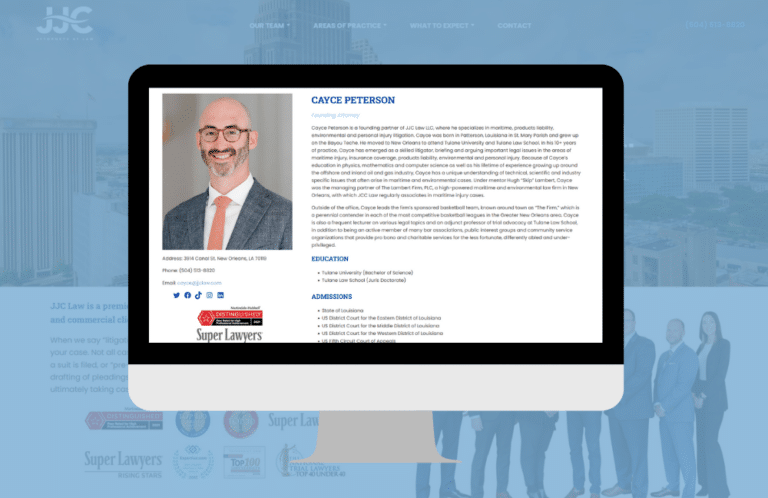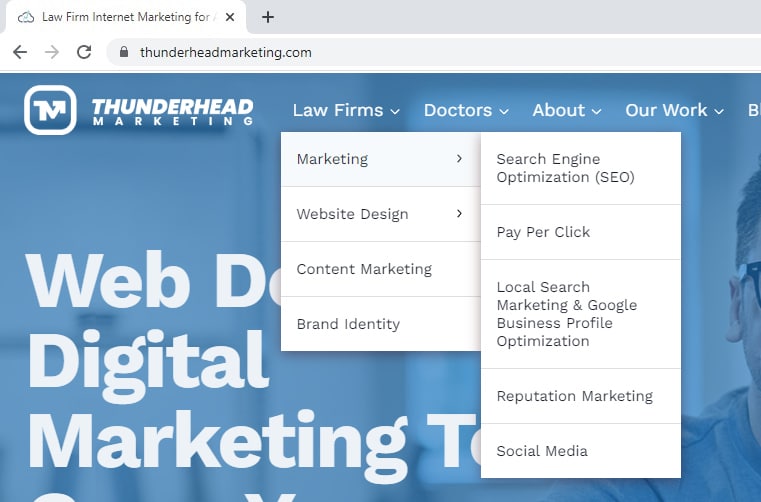Negative reviews can feel like a punch to the gut, especially when you’ve dedicated your life to providing excellent legal representation. Whether it’s about a long wait time or a client who felt misunderstood, the sting of criticism can linger. For attorneys, who often operate under high stress, a negative review may feel like it tarnishes the trust they’ve worked so hard to build. But here’s the truth: negative reviews are inevitable. Every attorney gets them, and more importantly, they don’t have to be the death knell for your law firm.
In fact, negative reviews can be an opportunity. When handled properly, these critiques can enhance your practice, foster client loyalty, and even build trust in a way glowing praise doesn’t. Research shows that potential clients often look for how a law firm responds to complaints, and that a handful of bad reviews can make you seem more human and relatable. In this post, we’ll explore how to not only survive but to leverage negative reviews to strengthen your reputation and improve your client relationships.
Why Negative Reviews Aren’t All Bad: The Pratfall Effect
Believe it or not, a few negative reviews can actually work in your favor. While it may seem counterintuitive, the occasional bad review can make you appear more relatable and trustworthy to potential clients. This concept is known as the Pratfall Effect — a psychological phenomenon where people perceive individuals or businesses with minor flaws as more likable than those that seem perfect.
Think about it: if every review of your law firm is a glowing 5-star endorsement, potential clients might question the authenticity of those reviews. It can make your law firm feel distant, almost too good to be true. But when mixed in with a few less-than-stellar reviews, your overall reputation becomes more believable. Clients are more likely to trust a lawyer who, like them, is human and occasionally has an off day.
The key here is balance. A practice filled with 5-star ratings and a couple of one-star critiques comes across as real and approachable. Clients are more likely to think, “If this attorney has overwhelmingly positive reviews but a few tough ones, they must be genuine.” The Pratfall Effect can actually build trust, showing that you’re not trying to hide anything — and that you’re dedicated to addressing and improving any client concerns.
By embracing this effect, you can shift your mindset. Negative reviews aren’t a personal attack; they’re a chance to appear more human, allowing future clients to feel more comfortable choosing you as their legal representative.
Building Trust by Handling Negative Reviews: A Step-by-Step Guide
Negative reviews, while challenging, offer an opportunity to build trust with both current and potential clients. The way you respond can demonstrate accountability, compassion, and a commitment to improvement. Here’s a step-by-step guide on how to handle negative reviews and turn them into trust-building opportunities.
1. Respond Quickly and Calmly
Speed matters. A timely response shows that client feedback is a priority. Even if the review feels harsh, remain calm and professional. Avoid defensiveness, as that can escalate the situation. Instead, take a moment to craft a thoughtful response that reflects your willingness to listen and improve.
2. Acknowledge the Issue and Show Empathy
Clients want to feel heard. Acknowledge their concerns — even if you feel the review is unjustified — with empathy. A simple, “We’re sorry to hear you were disappointed” can go a long way in showing you care. When clients feel that their concerns are recognized, it diffuses tension and humanizes your practice.
3. Apologize and Take Responsibility (When Appropriate)
If there’s truth in the complaint, don’t hesitate to take responsibility. An apology doesn’t weaken your credibility; it strengthens it by showing you’re willing to address mistakes. Even when the situation was out of your control, an apology like, “We’re sorry the experience didn’t meet your expectations,” reassures clients that your law firm strives for better outcomes.
4. Highlight Corrective Actions and Commitment to Improvement
This step is critical for building trust. When clients see that you’re taking their feedback seriously, it fosters confidence. If recurring issues — such as communication problems — are raised, explain what steps you’re taking to resolve them. For example: “We know that delayed response times can be frustrating. We are actively adjusting our processes to improve client communication.”
5. Move the Conversation Offline
Some issues are best resolved privately. Invite the client to discuss their concerns further over the phone or in person. This not only protects client confidentiality but also shows you’re serious about addressing the issue without turning it into a public spectacle. Example: “We’d love the opportunity to speak with you directly. Please call our office so we can better understand your experience.”
6. Thank the Client for Their Feedback
Thanking clients, even for negative feedback, shows you value their input. A line like “Thank you for sharing these concerns” turns a negative experience into a learning opportunity, showing your law firm views all feedback as a tool for improvement.
7. Reassure Future Clients
Keep in mind that your response isn’t just for the client who left the review — potential clients are also watching. A professional, solution-focused response demonstrates that, if something goes wrong, you’ll handle it with care and respect. By addressing concerns constructively, you reassure future clients that they’re in capable hands.
Why This Approach Works
By following these steps, you’re not only addressing negative reviews but also actively building trust with both existing and potential clients. A well-handled negative review demonstrates that you care, are transparent, and are always looking to improve. This trust-building approach turns criticism into an asset for your law firm.
Encouraging Positive Reviews to Offset the Negative
While handling negative reviews with care is essential, encouraging a steady flow of positive reviews is equally important in maintaining a balanced, trustworthy online reputation. Positive reviews not only help to offset any negative feedback but also highlight the great experiences most clients have at your practice. Here’s how you can encourage your satisfied clients to share their thoughts without feeling pushy.
1. Ask at the Right Time
Timing is everything when requesting a review. The best time to ask for feedback is right after a successful client interaction — perhaps after a their case is won or when they express gratitude for the service they received. For example, when a client thanks you or your staff, that’s a perfect moment to say, “We’re so glad you had a positive experience. If you don’t mind, we’d love for you to share that in a review.” This gentle ask feels natural and organic.

2. Make It Easy to Leave a Review
One of the most common reasons clients don’t leave reviews is that the process feels complicated or time-consuming. Simplify the process by sending them a direct link to your preferred review platform — whether it’s Google, Avvo, or another site. A follow-up email or text message that says, “Thank you for choosing our law firm! We’d greatly appreciate it if you could take a moment to leave us a review” makes it easier for clients to follow through.
3. Use Follow-Up Communication
Incorporating a polite request for reviews into your follow-up communication is another effective strategy. For instance, after a positive case resolution, you can send a follow-up email to check on the client and include a brief line encouraging them to share their experience. Something like, “Your feedback helps us improve and serve our clients better. If you had a good experience, we’d love to hear about it in a review!” can gently nudge satisfied clients to respond.
4. Involve Your Staff
Your office staff plays a key role in encouraging reviews. Train them to recognize when a client is leaving with a smile on their face and prompt them to ask for a review before the client walks out the door. A simple, “If you had a good experience today, we’d appreciate it if you could leave us a quick review online,” can make a big difference. Clients are often more likely to follow through when they’ve been asked in person by someone they interacted with directly.
5. Create a Review Culture
Building a culture where feedback is regularly sought and celebrated can lead to more consistent reviews. Remind clients during their visits that their opinion matters, not just to your team but to other clients as well. You can even display signage in your office with gentle prompts like, “We value your feedback — share your experience with us online!” This keeps the idea of reviews in the back of their minds.
6. Respond to Positive Reviews
When you receive a positive review, take a moment to thank the client publicly. A simple response like, “Thank you for your kind words! We’re thrilled to hear you had a great experience” shows that you appreciate their feedback. Responding to positive reviews strengthens your connection with that client and demonstrates to others that you actively engage with feedback, both good and bad.
Using Negative Reviews as Internal Feedback
Negative reviews aren’t just valuable for managing your online reputation — they can also serve as a crucial tool for internal improvement. The feedback you receive, even when it’s critical, can reveal patterns and issues within your practice that you might not be aware of. By treating negative reviews as constructive feedback, you can make meaningful changes that benefit both your team and your clients. Here’s how to use them effectively for internal growth:
1. Identify Recurring Issues
If multiple clients mention the same concerns — whether it’s long wait times, communication gaps, or problems with staff interactions — it’s a sign that something needs to change. Recurring themes in reviews provide insight into areas of your law firm that may need attention. For instance, if clients frequently complain about delayed responses to phone messages, it might be time to reassess your office workflow. Regularly reviewing and categorizing client complaints can help you pinpoint exactly where these issues are occurring.
2. Use Feedback for Staff Training
Negative reviews offer a window into client experiences that might otherwise go unnoticed. This feedback can be used as a teaching tool for your staff. For example, if clients mention unfriendly interactions with the front desk or unclear communication about their case, this is an opportunity for retraining or additional customer service development.
3. Improve Operational Efficiency
Reviews can highlight inefficiencies that you might not see from inside the practice. Whether it’s billing issues, lack of clarity in appointment scheduling, or inadequate response times, negative reviews can reveal weak spots in your operational processes. Use this feedback to streamline workflows, improve client communication, and address logistical bottlenecks.
4. Monitor Changes and Adjust as Needed
After making improvements based on feedback, continue to monitor reviews to see if the changes have had a positive effect. Has the number of complaints about response times decreased? Are there fewer comments about staff interactions? This ongoing review process allows you to track the effectiveness of your adjustments and make further changes if necessary.
5. Foster a Culture of Continuous Improvement
Encourage your team to view negative feedback as an opportunity for growth rather than criticism. Create a culture where everyone is invested in improving service, and make it clear that client feedback, whether good or bad, is a valuable part of that process. By framing reviews as learning tools, your law firm can continually evolve and improve its quality of service.
Turning Negativity into Opportunity
By responding with empathy, professionalism, and a genuine desire to improve, you can turn even the harshest reviews into moments that build trust and strengthen client relationships. When potential clients see how you handle challenges, they’ll feel reassured that your law firm values transparency and is committed to delivering excellent care.
Every piece of feedback is a chance to refine your services and show future clients that you’re attentive to their needs. By actively managing your online reputation and encouraging positive reviews, you’ll create a balanced, authentic reflection of your legal practice — one that stands out for its integrity and dedication.
If you’re ready to take control of your online reputation and turn negative reviews into opportunities, contact Thunderhead Marketing for a consultation. We specialize in helping law firms enhance their online presence, build trust, and attract new clients through smart, proactive reputation management strategies. Let us help you leverage reviews to grow your firm and strengthen client loyalty.







